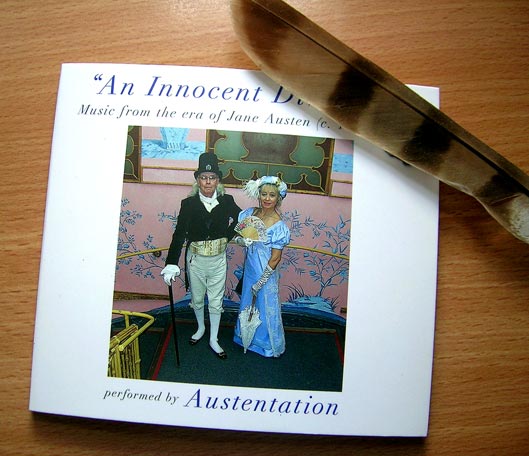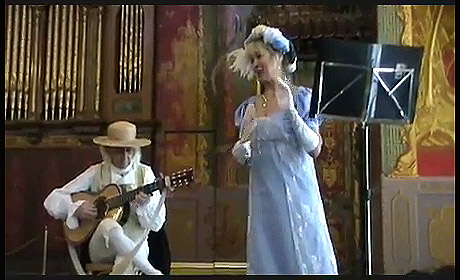Austentation.org

'An Innocent Diversion'
Music of the era of Jane Austen (c 1770-1820)
'A tremendously convincing, authentic and skilful representation of the performance of the time'
'light-hearted song by two talented musicians'

This album represents music popular during the late Georgian period, 1770-1820, the period of the life of novelist Jane Austen (1775-1817) who was also an accomplished musician.
Jane played the keyboard, sang and possibly also played the guitar: she arranged songs, keyboard pieces and dance tunes, and also composed songs and pieces herself. Recent research indicates that she may even have written the lyrics to the song The Irishman.
Put together after research in Oxford and Chawton by members of the Oxford Jane Austen Group, this collection reflects the type of performance heard during a domestic entertainment in this period, featuring the newly popular 'romantic guitar' which had developed from the five and six course baroque guitar.
Plaisir d'Amour is a popular French song by German-born composer Giuseppe Martini, and reputedly one of Marie Antoinette's favourite songs. Many versions of this have been recorded, including one by folk singer Joan Baez. It is just possible that Jane Austen may have heard this sung or played by her cousin, and later sister in law, Betsy Hancock, aka Comtesse Eliza de Feuillide.
Bluebell of Scotland is a ballad based on 'Scotch' folk songs, in Jane Austen's collection at Chawton House, Hampshire, while the Rondo, originally for harp, here arranged for guitar and attributed to F A Boiledieu (1775 - 1834), comes from the music books of Maud Graham. The Lass of Richmond Hill is understood by many to refer to Maria Fitzherbert, the morganatic wife of George, Prince of Wales, later Prince Regent and George IV.
Greensleeves is probably the best known among English songs, and was still widely performed in the early 19th century. Caro Mio Ben is a well known Italian song of the Georgian period, sung unaccompanied by Gillie, and the song Yellow Haired Laddie is played by Frank as a guitar solo: another piece from the Jane Austen collection at Chawton House. Many versions of the piece were popular in the late 18th and early 19th centuries, including an arrangement by Haydn.
Silent Worship from the opera Ptolemy was one of Handel's most popular pieces, a great favourite of drawing rooms and assemblies of Regency England. Los Canarios remains a modern favourite for guitar, by Gaspar Sanz, and from his book of pieces from 1674. The Water is Wide is a familiar folk song of the early 19th century also known as 'Waly Waly', sung and played by Frank.

We then have a typical set of Variations on a German theme by Anton Diabelli, composer pianist and guitarist, and friend of Beethoven - though this is not the famous piano variations by Beethoven! The Bach prelude is a well-known piece from the Dm lute suite. And we finish with The Irishman - did Jane Austen really write the lyrics to fit this traditional tune? I don't think we will ever know for sure, but the wit and spark of the song fits her early style. This became a 20th century hit for Lonnie Donegan, Miki & Griff, Dolly Parton, Johnny Cash and others!
Austentation and Folly Bridge Records would like to record their thanks to Brighton Pavilion & Museums, to the parish of St Andrew's in Great Rollright who kindly permitted the use of the church for recording; and to St John's College Oxford for photo opportunities; and to 4Music Ltd.
 Share...
contact: webmaster @ austentation.org
Share...
contact: webmaster @ austentation.org

